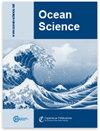Assimilation of sea surface salinities from SMOS in an Arctic coupled ocean and sea ice reanalysis
IF 3.3
3区 地球科学
Q2 METEOROLOGY & ATMOSPHERIC SCIENCES
引用次数: 1
Abstract
Abstract. In the Arctic, the sea surface salinity (SSS) plays a key role in processes related to water mixing and sea ice. However, the lack of salinity observations causes large uncertainties in Arctic Ocean forecasts and reanalysis. Recently the Soil Moisture and Ocean Salinity (SMOS) satellite mission was used by the Barcelona Expert Centre to develop an Arctic SSS product. In this study, we evaluate the impact of assimilating this data in a coupled ocean–ice data assimilation system. Using the deterministic ensemble Kalman filter from July to December 2016, two assimilation runs respectively assimilated two successive versions of the SMOS SSS product on top of a pre-existing reanalysis run. The runs were validated against independent in situ salinity profiles in the Arctic. The results show that the biases and the root-mean-squared differences (RMSD) of SSS are reduced by 10 % to 50 % depending on the area and highlight the importance of assimilating satellite salinity data. The time series of freshwater content (FWC) further shows that its seasonal cycle can be adjusted by assimilation of the SSS products, which is encouraging of the assimilation of SSS in a long-time reanalysis to better reproduce the Arctic water cycle.北极耦合海洋和海冰再分析中SMOS对海面盐度的同化
摘要在北极,海面盐度(SSS)在与水混合和海冰相关的过程中起着关键作用。然而,由于缺乏盐度观测,北冰洋的预报和再分析存在很大的不确定性。最近,巴塞罗那专家中心利用土壤湿度和海洋盐度(SMOS)卫星发射数据开发了一种北极SSS产品。在本研究中,我们评估了在耦合海冰数据同化系统中同化这些数据的影响。使用2016年7月至12月的确定性集合卡尔曼滤波,两次同化运行分别同化了SMOS SSS产品的两个连续版本。这些运行是根据北极独立的原位盐度剖面进行验证的。结果表明,SSS的偏差和均方根差(RMSD)随区域的不同降低了10% ~ 50%,突出了同化卫星盐度数据的重要性。时间序列淡水含量(FWC)进一步表明,其季节周期可以通过同化SSS产品来调整,这有助于在长期再分析中同化SSS以更好地再现北极水循环。
本文章由计算机程序翻译,如有差异,请以英文原文为准。
求助全文
约1分钟内获得全文
求助全文
来源期刊

Ocean Science
地学-海洋学
CiteScore
5.90
自引率
6.20%
发文量
78
审稿时长
6-12 weeks
期刊介绍:
Ocean Science (OS) is a not-for-profit international open-access scientific journal dedicated to the publication and discussion of research articles, short communications, and review papers on all aspects of ocean science: experimental, theoretical, and laboratory. The primary objective is to publish a very high-quality scientific journal with free Internet-based access for researchers and other interested people throughout the world.
Electronic submission of articles is used to keep publication costs to a minimum. The costs will be covered by a moderate per-page charge paid by the authors. The peer-review process also makes use of the Internet. It includes an 8-week online discussion period with the original submitted manuscript and all comments. If accepted, the final revised paper will be published online.
Ocean Science covers the following fields: ocean physics (i.e. ocean structure, circulation, tides, and internal waves); ocean chemistry; biological oceanography; air–sea interactions; ocean models – physical, chemical, biological, and biochemical; coastal and shelf edge processes; paleooceanography.
 求助内容:
求助内容: 应助结果提醒方式:
应助结果提醒方式:


